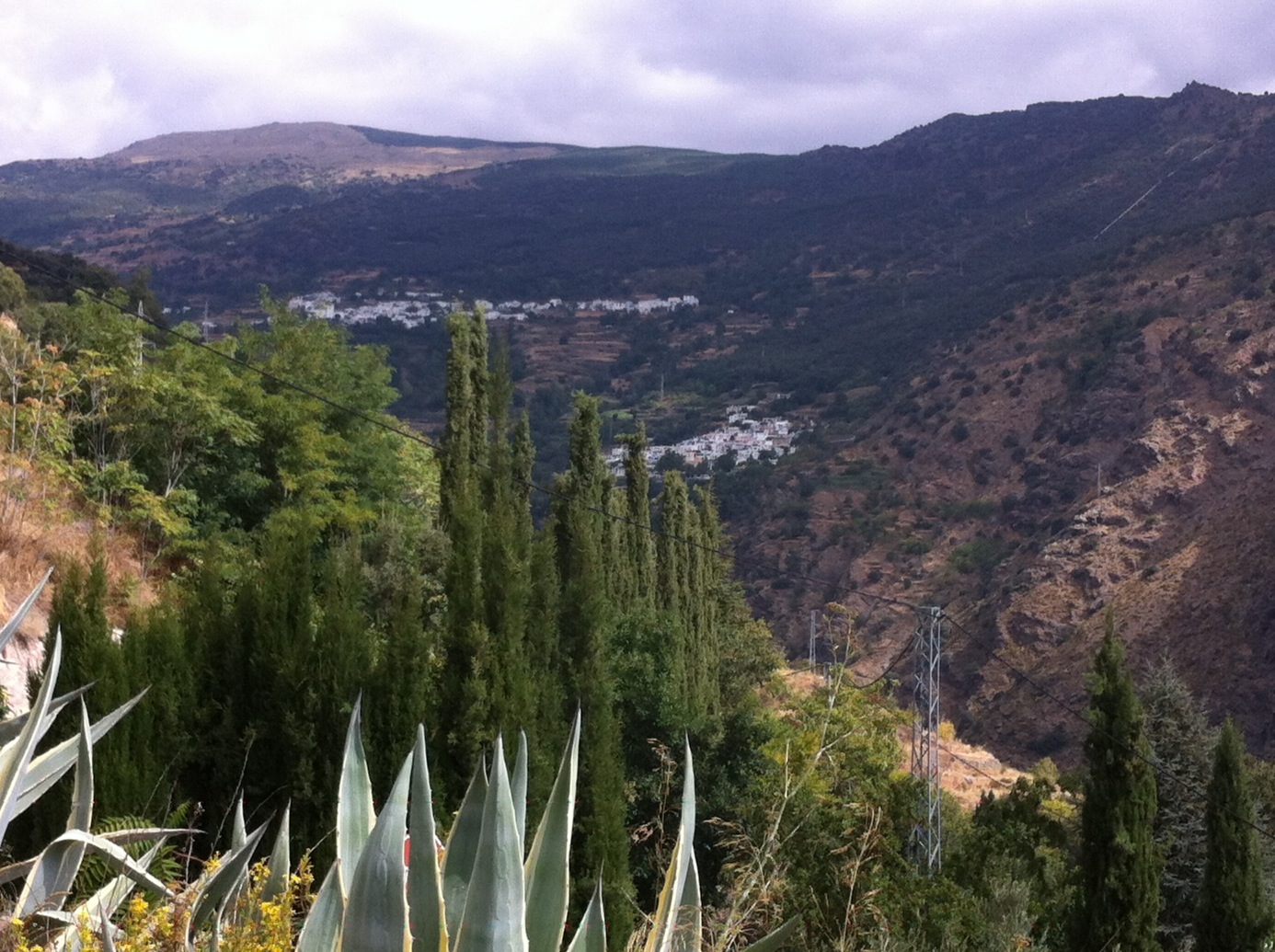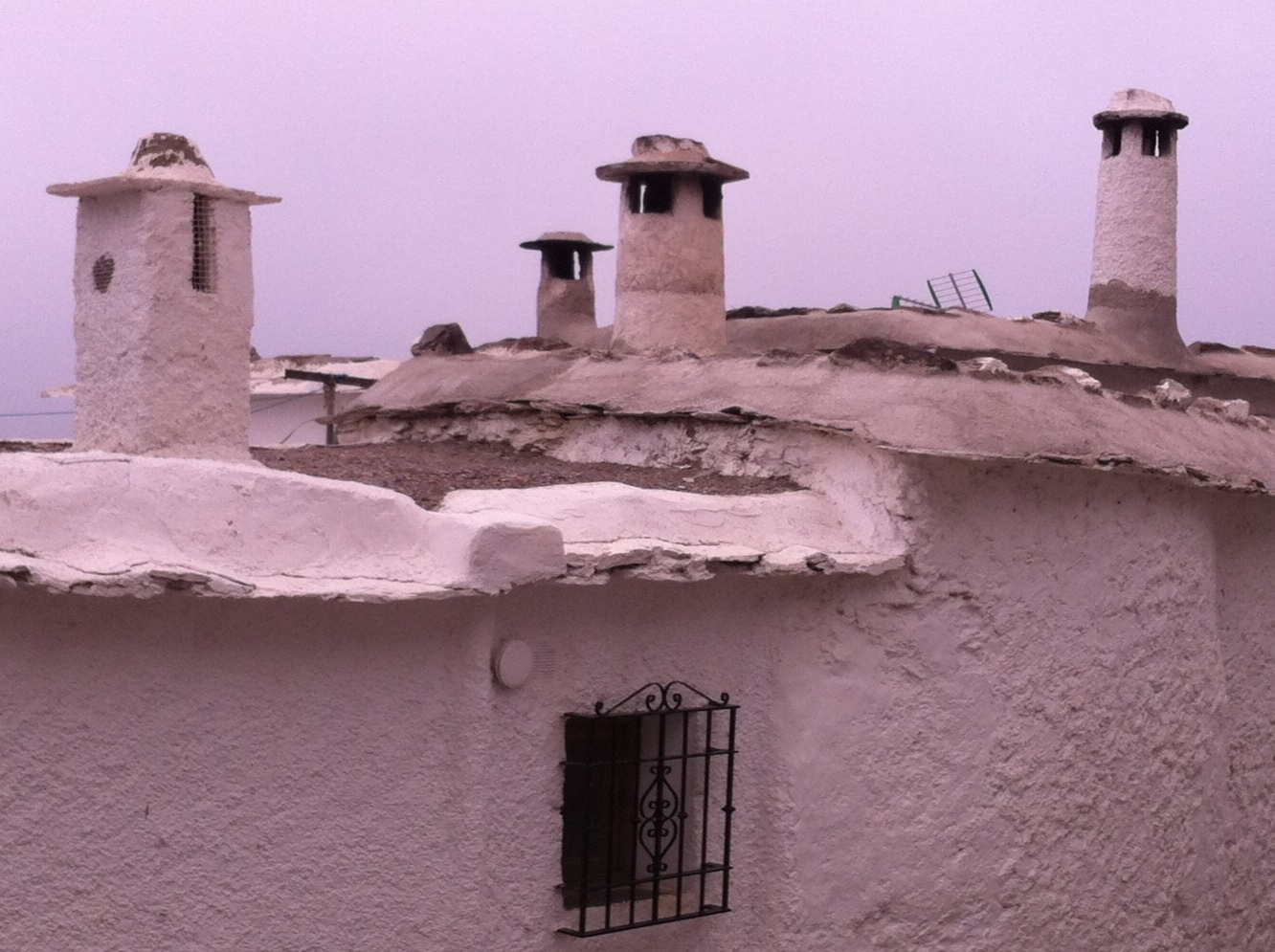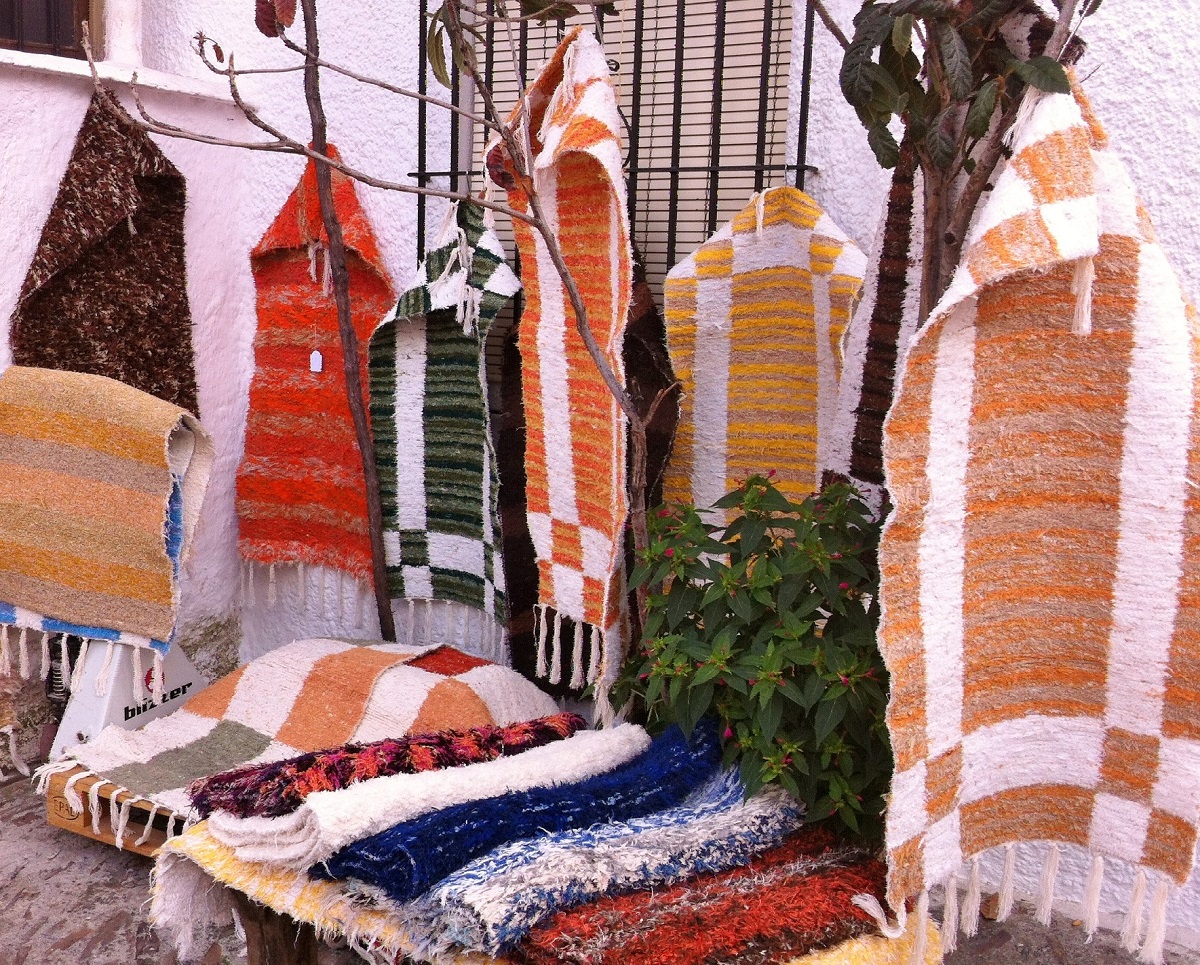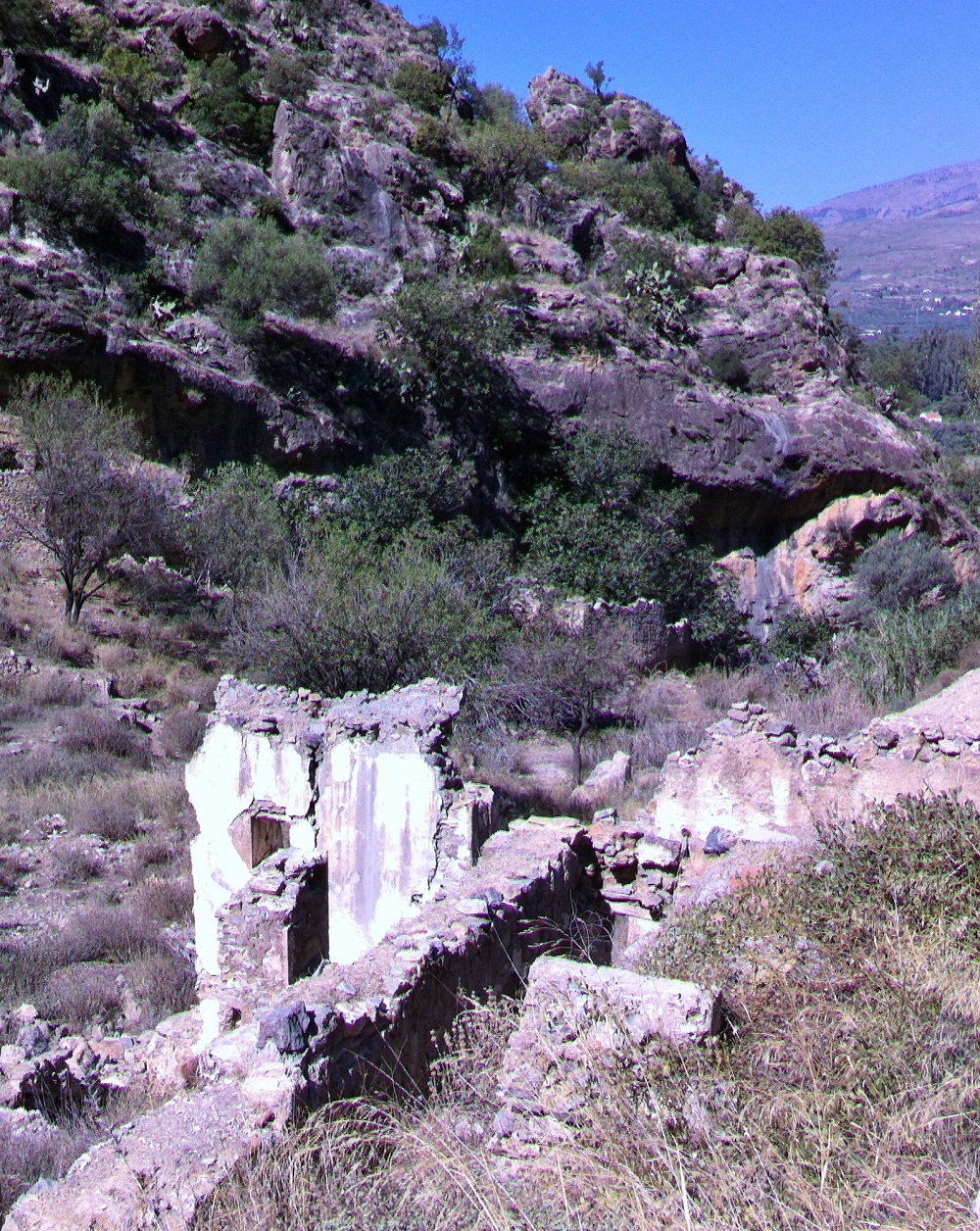First thing I did wrong was that I asked for un cafe nube doble en vaso. My usual milky coffee. Nope - I was in Orgiva in Granada province, now, so must remember to ask for una leche manchada doble en vaso. La dueña was ancient, and widowed (guessing by the black widows' weeds) and corrected me politely.
As I took my coffee outside to the patio she jerked her head towards the pile of second-hand books on a rickety table. A good selection of UK crime writers, a dog-eared copy of Chris Stewart's "Driving Over Lemons" and half a dozen pristine Jeffrey Archers. "Do you want any?" she asked. "You can buy, or exchange." "Are there are lot of British around here then?" I asked her. "Si muchos. Desde hace ese libro, el sobre limones." "Yes lots. Since that book, the one about the lemons."
 I asked her if that was good, tourists spending money in the area, following the now well-worn trail along the valley where Chris Stewart renovated his finca? She shrugged, non-committal.
I asked her if that was good, tourists spending money in the area, following the now well-worn trail along the valley where Chris Stewart renovated his finca? She shrugged, non-committal.
Of course the Alpujarras have always been popular with walkers, and remote ventas offered rooms in the 1950s and 60s to the more adventurous tourists. Post-Franco, tourism boomed and not everyone flocked to the costas. A few scattered attractive hotels opened inland for discerning travellers. In France, "A Year In Provence" changed the face of that region forever in 1989. It was another ten years before the drummer who left Genesis just before they hit the big time, made a splash in a remote mountain valley in southern Spain in 1999.
 The walkers would have continued to come anyway. But what the Poqueira and Trevelez valleys weren't prepared for was the flood of buyers, all wanting to replicate the charmingly-incompetent renovation process and to experience the harsh rusticity of the "real Spain". Some locals made a killing, selling run-down old goat-shelters to unsuspecting buyers for astronomical amounts. Land without licence to build was snapped up across the hillsides as people believed (or were told) that permission was unnecessary. Swimming pools were installed next to shepherds' huts. Locals re-branded themselves as "fixers" and "project managers" to deal with the building projects for absent overseas clients.
The walkers would have continued to come anyway. But what the Poqueira and Trevelez valleys weren't prepared for was the flood of buyers, all wanting to replicate the charmingly-incompetent renovation process and to experience the harsh rusticity of the "real Spain". Some locals made a killing, selling run-down old goat-shelters to unsuspecting buyers for astronomical amounts. Land without licence to build was snapped up across the hillsides as people believed (or were told) that permission was unnecessary. Swimming pools were installed next to shepherds' huts. Locals re-branded themselves as "fixers" and "project managers" to deal with the building projects for absent overseas clients.
 And so in the busy squares of the now-famous villages, Orgiva, Trevelez, Pitres, Portugos, Pampiliera, Bubión and Capiliera, the tourists throng, the menus are in English, and the price of a Menu del Día at lunchtime can be as much as €18.50. A block away, however, are cosy back-street bars bustling with Spanish families, where €8 still gets a generous three courses with freshly-baked bread and an interesting conversation about how every extranjero moving into the area wants that same experience of being "the first" incomer. Alfonso laughed as he told me of the new arrivals who actually don't want there to be electricity or running water - they seem to believe that living without basic infrastructure is somehow "more authentic".
And so in the busy squares of the now-famous villages, Orgiva, Trevelez, Pitres, Portugos, Pampiliera, Bubión and Capiliera, the tourists throng, the menus are in English, and the price of a Menu del Día at lunchtime can be as much as €18.50. A block away, however, are cosy back-street bars bustling with Spanish families, where €8 still gets a generous three courses with freshly-baked bread and an interesting conversation about how every extranjero moving into the area wants that same experience of being "the first" incomer. Alfonso laughed as he told me of the new arrivals who actually don't want there to be electricity or running water - they seem to believe that living without basic infrastructure is somehow "more authentic".
 Up in the clouds as I walked on high mountain tracks, the busy villages and tourist shops felt a million miles away. I must have passed a couple of dozen run-down dwellings, either half-built, or half-collapsed. Had they been someone's abandoned hopes of a new life in the valley where everyone dreams of driving over lemons?
Up in the clouds as I walked on high mountain tracks, the busy villages and tourist shops felt a million miles away. I must have passed a couple of dozen run-down dwellings, either half-built, or half-collapsed. Had they been someone's abandoned hopes of a new life in the valley where everyone dreams of driving over lemons?
After a couple of days in the mountains I descended back down through the valley. On the edge of Orgiva I went for a farewell coffee with la dueña. She grinned her toothless grin when I remembered to order una leche manchada. "Te vas a Málaga ahora?" "Are you going back to Málaga?" she asked me. "Then you can call it a cafe nube again" and she doubled up with laughter.
On the book table the whole heap of Jeffrey Archer books had gone. Perhaps inspiring a new generation of writers or politicians? The tattered copy of "Driving Over Lemons" was still there. Presumably everyone round here already has it.
© Tamara Essex 2013
THIS WEEK'S LANGUAGE POINT
Just as in English, the verb "to make" can also be used when something MAKES you feel a certain way, or MAKES something happen. For example "Me hace contenta" - it makes me happy. "Le hizo rico" - it made him rich. In this construction we usually use the third person singular as it is something external or abstract that is making me, her, or us feel a certain way. "Nos hace sentir triste" - it makes us feel sad.